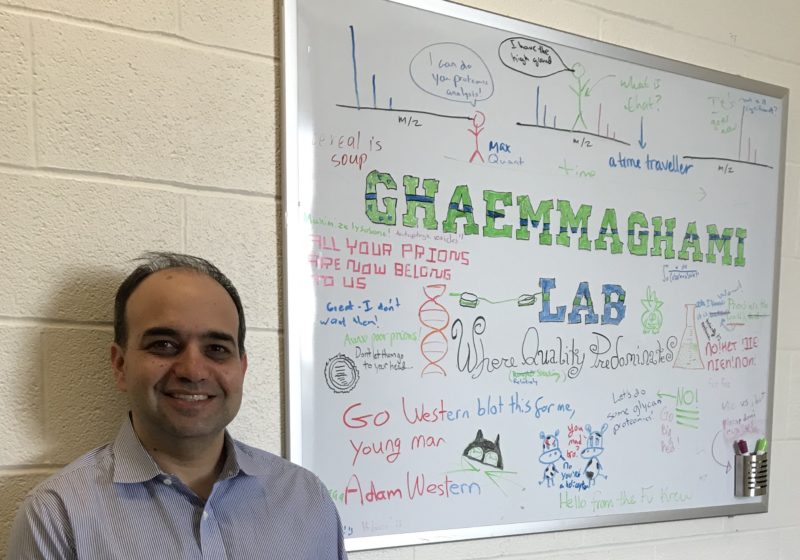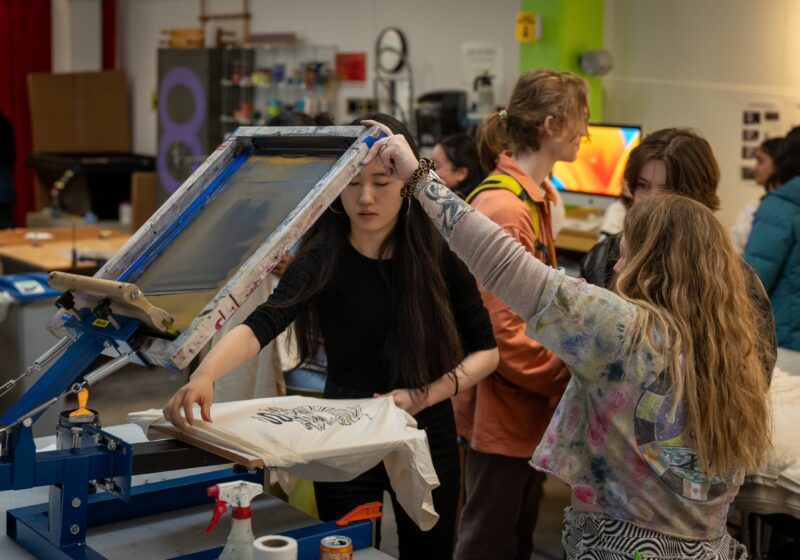Dr. Sina Ghaemmaghami has had a profound impact on the biology department, its faculty, and its students. He maintains a perfect 5.0 on “RateMyProfessor”, and is ranked No. 3 in OneClass.com’s list of “Top 10 Professors at the University of Rochester.”
Most students in the biology and chemistry departments are familiar with Ghaemmaghami’s reputation as a professor, and a few of his students each semester join his proteomics lab on the third floor of Hutchison Hall. The Ghaemmaghami Lab is conducting groundbreaking research characterizing protein homeostasis during aging and disease, to which undergraduates have made meaningful contributions. Ghaemmaghami has mentored over 25 undergraduates during his time at UR, many of whom have gone on to leading graduate programs, medical school, and industry. The Ghaemmaghami lab slogan, “Thoughtful Science by Nice People,” is printed on their lab t-shirts.
Undergraduates who aspire to pursue academia benefit from consulting role models and mentors for career advice. This system relies on established professors like Ghaemmaghami, who take on mentoring roles and aim to nurture the next generation of scientists. Not too long ago, he was on the other side of this mentor-student relationship. Ghaemmaghami remembers how he fell in love with academia, the path he took to achieve professorship, and the mentors who helped him along the way.
Ghaemmaghami became interested in biochemistry when he got involved in research as an undergraduate at McMaster University in Canada. “I loved the culture of working in the lab and interacting with people and talking about ideas,” he said.
To further explore his piqued interest, an undergraduate Ghaemmaghami pursued a co-op with Merck, a pharmaceutical company. He used crystallography to purify drug targets. “One good thing about working for a company is that you’re really part of a team, and it’s very structured,” Ghaemmaghami said. “Academic labs tend to be more chaotic and less efficient.”
However, industry does not provide room for creativity. Companies decide which projects to continue based on the financial outcomes, not on which questions are most interesting. At Merck, Ghaemmaghami experienced this firsthand. “I was trying to crystallize this one protein, and then had to drop the whole thing,” he said. “Working at a company, you have to do what the company wants to do.”
Working in his academic lab at McMaster, a young Ghaemmaghami fell in love with the culture of research. “You can ask the kind of questions you’re interested in,” he said. “There aren’t too many jobs like that. It’s a special gig.”
Ghaemmaghami entered the biophysics Ph.D. program at Duke and worked in Dr. Terry Oas’s lab studying the physics of protein folding. He developed a method of quantifying protein stabilities within the cell, which informed future proteomics studies.
During Ghaemmaghami’s subsequent post-doc at University of California, San Francisco, he studied global protein expression in yeast. By individually tagging each and every intracellular protein, he was able to quantify their levels and provide a tool to study each protein’s individual interactions inside the cell. He published a high-impact paper in Nature, the world’s leading multidisciplinary scientific journal, and made the system available for other scientists to use. 2,483 following publications cited his work, a testament to the significance of Ghaemmaghami’s studies. “That was really gratifying to see,” he said.
Ghaemmaghami’s success at UCSF launched him to a faculty position at UR in 2012, where he now continues to address important questions in the field of proteomics. The lab studies protein stability and protein damage using novel mass spectrometry methods. Protein homeostasis plays a big role in neurodegenerative diseases, like Alzheimer’s, along with other age-related diseases. Ghaemmaghami was recently tenured after six years at UR, a milestone career accomplishment.
Impactful research is a team effort. A big factor in succeeding as a lab leader is the ability to manage people, inspire them, and draw out their potential. Upon his arrival at UR, Ghaemmaghami took advantage of the rich student population and quickly filled his lab with motivated graduate and undergraduate students. “I love being around people of different ages and in different parts of their career,” he said. “I really enjoy having undergrads in the lab, and I think that’s something that’s really special about this university: undergrads doing serious research.”
Ghaemmaghami has been focused on the teaching and mentoring elements of academia as well as the science. Everyone in the lab has different motivations and interests and contributes something unique. He makes an effort to personalize his mentorship for each individual to best capitalize on their potential as a scientist. “There’s no handbook,” he said. “I’ve had three very different kinds of mentors, and I borrow from each of them.”
Ghaemmaghami’s first doctoral degree student, Tian Zhang, recently graduated with seven publications. “It has been an honor to be his student,” she stated in her thesis. “I appreciate all his contributions of time and ideas. I am also thankful for the excellent example he has provided as a human being and an excellent advisor.”
Zhang is currently doing a post-doc at Harvard Medical School. “Once you see one grad student go through the entire process, that’s really gratifying,” Ghaemmaghami said. “She really blossomed.”
What does it take to achieve and maintain this level of career success and satisfaction? At its core, the answer is simple. “The reason people get into science is because it’s interesting and because it’s fun,” Ghaemmaghami said. “It’s a labor of love.”
Doing exciting research on campus? Contact Audrey at agoldfa5@u.rochester.edu to tell her about it and potentially be featured in the next edition of Research Rochester.





